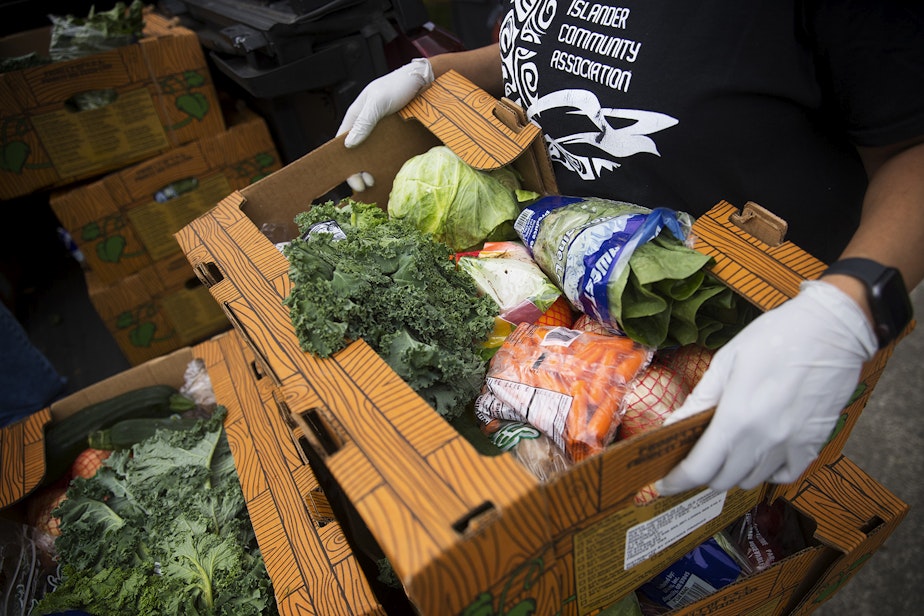How WA food banks are handling a hunger cliff

Emergency benefits from the Supplemental Nutrition Assistance Program — better known as SNAP — have ended.
The change in federal law affects more than half a million households in Washington and represents a loss of about $95 million a month in food assistance.
This reduction hits even as food and housing costs increase. Researchers at the University of Washington and Washington State University have been tracking food insecurity in the state since the pandemic began.
In a study published earlier this year, they found food insecurity was highest in households made up of people of color, families with children, and among renters.
In Washington, the additional pandemic assistance added an average of $171 per month to families’ food budgets. With that boost gone, more people will need to rely on already stretched local food banks, which have been helping to fill that gap since the pandemic started.
Soundside host Libby Denkmann caught up with Christina Wong, the director of Public Policy at Northwest Harvest, a nonprofit supporting food banks across Washington state.
Sponsored
Wong said that even before the emergency allotment to SNAP benefits ran out, she was hearing from partner food banks about longer lines.
"Anywhere between 30% increase to even double what they were seeing before," Wong said.
Rising food costs due to inflation means that food stamps are used up quicker at grocery stores, Wong said, and people will have to turn to the food banks sooner to fill the gaps.
Nothing can be done about food costs in the short-term. But Wong said she's optimistic that the state Legislature will pass HB 1784, which would give agencies an emergency infusion of $28 million to tackle needs like increasing inventories and managing food delivery systems.
"If it moves to the Senate quickly, and on to the governor's desk, that hopefully we could see resources in community as soon as April," Wong said.
Sponsored
Feeding rural communities
The infusion of cash from HB 1784 could make significant inroads in addressing hunger in Eastern Washington in particular.
Paige Collins, the executive director of Colfax-based nonprofit The Council on Aging & Human Services, said the the pantries they collaborate with through their nutrition programs have already seen a big jump in demand recently as grocery, gas, and rent bills have climbed.
"When you're a pantry that normally serves 20, and now you're serving 40, that's a big deal," Collins said.
In that latest UW and WSU food assistance survey, Spokane County topped the list with the highest percentage of respondents reporting very low food security.
Sponsored
Eric Williams is the community partnership director at 2nd Harvest Inland Northwest, which is based in Spokane. The organization serves 26 counties in Eastern Washington and northern Idaho.
Williams said there are major benefits to being a food distributor in a bountiful agricultural region. Donations often come in from local farms, directly from producers.
But the challenges of feeding rural communities are steep.
"If we were a state, there'd be 19 or 20 states geographically size wise, that would be smaller than us. So it's a very large area to cover just getting to the folks who are in the rural areas," Williams said.
Other challenges include a lack of internet connectivity, diesel prices, and a lack of awareness around available services.
Sponsored
If Washingtonians want to help food banks right now, Williams said food or monetary donations are both greatly appreciated.
Volunteering at a local food bank can also help make a difference in getting more food into the hands of hungry Washingtonians.



